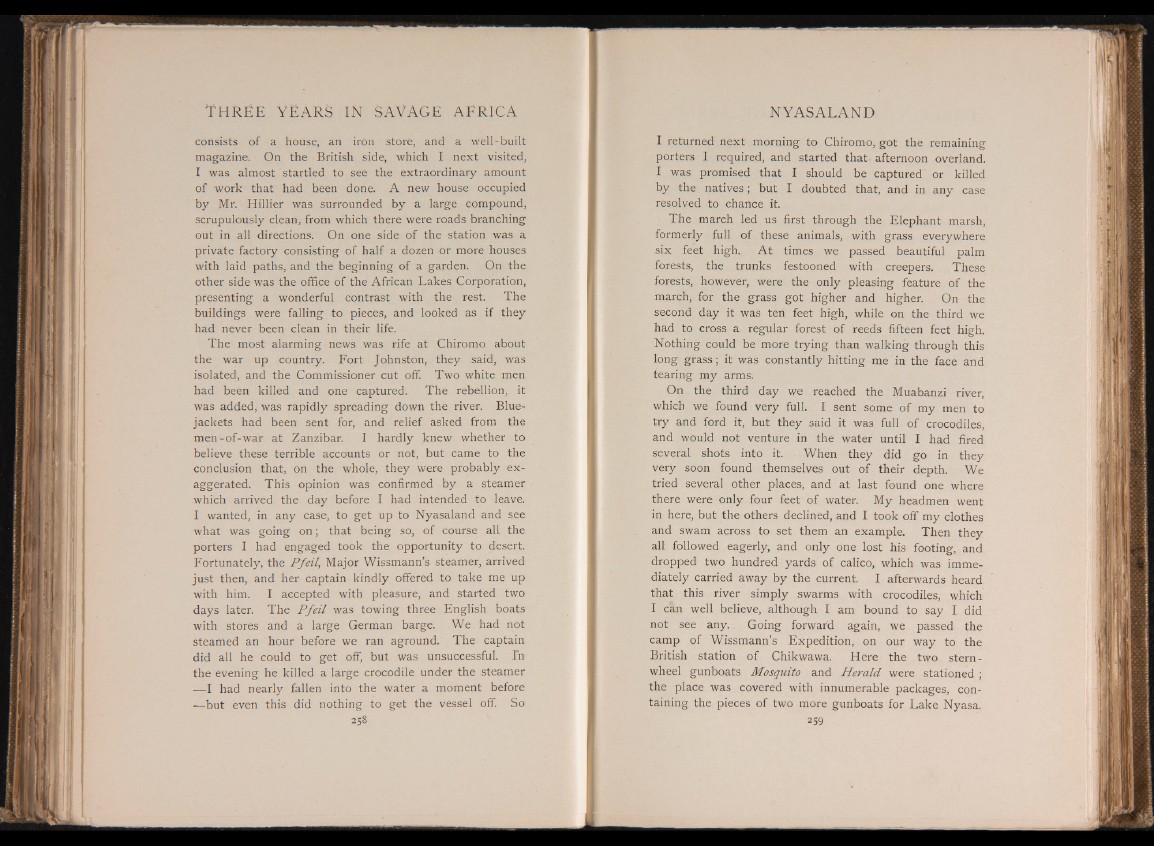
consists of a house, an iron store, and a well-built
magazine. On the British side, which I next visited,
I was almost startled to see the extraordinary amount
of work that had been done. A new house occupied
by Mr. Hillier was surrounded by a large compound,
scrupulously clean, from which there were roads branching
out in all directions. On one side of the station was a
private factory consisting of half a dozen or more houses
with laid paths, and the beginning of a garden. On the
other side was the office of the African Lakes Corporation,
presenting a wonderful contrast with the rest. The
buildings were falling to pieces, and looked as if they
had never been clean in their life.
The most alarming news was rife at Chiromo about
the war up country. Fort Johnston, they said, was
isolated, and the Commissioner cut off. Two white men
had been killed and one captured. The rebellion, it
was added, was rapidly spreading down the river. Bluejackets
had been sent for, and relief asked from the
men-of-war at Zanzibar. I hardly knew whether to
believe these terrible accounts or not, but came to the
conclusion that, on the whole, they were probably exaggerated.
This opinion was confirmed by a steamer
which arrived the day before I had intended to leave.
I wanted, in any case, to get up to Nyasaland and see
what was going on; that being so, of course all the
porters I had engaged took the opportunity to desert.
Fortunately, the Pfeil, Major Wissmann’s steamer, arrived
just then, and her captain kindly offered to take me up
with him. I accepted with pleasure, and started two
days later. The P fe il was towing three English boats
with stores and a large German barge. We had not
steamed an hour before we ran aground. The captain
did all he could to get off, but was unsuccessful. In
the evening he killed a large crocodile under the steamer
■—I had nearly fallen into the water a moment before
—but even this did nothing to get the vessel off. So
258
I returned next morning to Chiromo, got the remaining
porters I required, and started that afternoon overland.
I was promised that I should be captured' or killed
by the natives; but I doubted that, and in any case
resolved to chance it.
The march led us first through the Elephant marsh,
formerly full of these animals, with grass everywhere
six feet high. At times we passed beautiful palm
forests, the trunks festooned with creepers. These
forests, however, were the only pleasing feature of the
march, for the grass got higher and higher. On the
setond day it was ten feet high, while on the third we
had to cross a regular forest of reeds fifteen feet high.
Nothing could be more trying than walking through this
long grass; it was constantly hitting me in the face and
tearing my arms.
On the third day we reached the Muabanzi river,
which we found very full. I sent some of my men to
try and ford it, but they said it was full of crocodiles,
and would not venture in the water until I had fired
several shots into it. When they did go in they
very soon found themselves out of their depth. We
tried several other places, and at last found one where
there were only four feet of water. My headmen went
in here, but the others declined, and I took off my clothes
and swam across to set them an example. Then they
all followed eagerly, and only one lost his footing, and
dropped two hundred yards of calico, which was immediately
carried away by the current. I afterwards heard
that this river simply swarms with crocodiles, which
I can well believe, although I am bound to say I did
not see any. Going forward again, we passed the
camp of Wissmann’s Expedition, on our way to the
British station of Chikwawa. Here the two stern-
wheel gunboats Mosquito and Herald were stationed ;
the place was covered with innumerable packages, containing
the pieces of two more gunboats for Lake Nyasa.
259